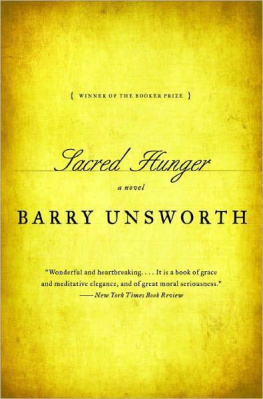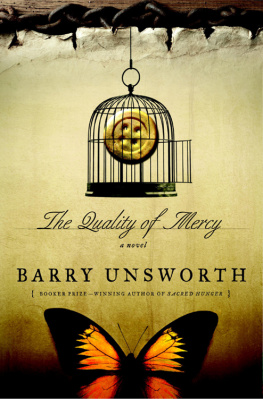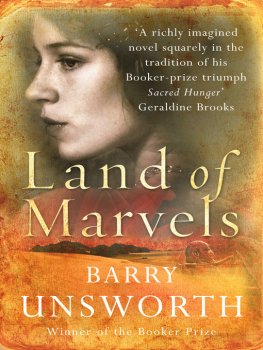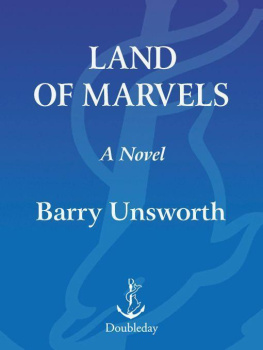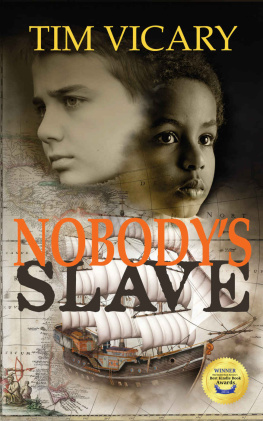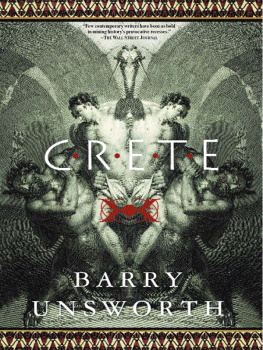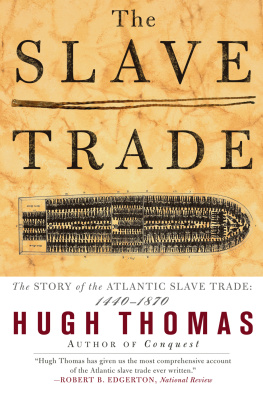Barry Unsworth
Sacred Hunger
First published in 1992
Winner of that years Booker Prize
To John, Madeleine and Felix Reiss. With love.
I should like to thank the British Council for the grant of a six-month Visiting Scholarship to Sweden and the staffs of the English Department and Library of Lund University, where the background reading for this novel was done, for their unfailing help and kindness.
Some safer world in depths of woods embracd,
Some happier island in the watry waste
Alexander Pope
According to Charles Townsend Mather, the mulatto was dark amber in colour and grey-haired and nearly blind. He was small-boned and delicately made and he had a way of tilting his head up when he spoke, as if seeking to admit more light to the curdled crystals of his eyes. He was an old plantation slave from Carolina, freed when he was past work and turned off the land. In the spring and summer of 1832 he was begging every day in the streets of New Orleans and down on the waterfront. He would wait on the quayside for paid-off sailors, to whom some clouded impulse of pity or contempt might come. He was a talker; whether there was anyone to hear or not, he went on muttering or shouting the details of his life.
His slave name was Luther, then Sawdust was added, because an overseer made him eat sawdust once to discourage him from answering backit seemed he had always been a talker. So Luther Sawdust. But in the bars along the waterfront he was known as the Paradise Nigger. He lived on scraps and spent what he had in the bars, where he was suffered for his gifts as an entertainer, until he got too drunk. People bought rum for him; he became something of an institution. He would sometimes play a tune on an old harmonica that he wore slung round his neck, or sing a song of the plantations. But mainly he talkedof a Liverpool ship, of a white father who had been doctor aboard her and had never died, a childhood of wonders in a place of eternal sunshine, jungle hummocks, great flocks of white birds rising from flooded savannahs, a settlement where white and black lived together in perfect accord. He claimed he could read. Also and Mather vouches for thishe quoted snatches from the poetry of Alexander Pope. In one of his occasional pieces for the Mississippi Recorder Mather declares that he actually heard him do it. These pieces were afterwards collected and published privately under the title Sketches of Old Louisiana. The only record of the Paradise Nigger that we have is contained in this little-known work, in the chapter entitled Colourful Characters of the Waterfront. Mather says that when he returned to New Orleans after an absence of a year or so he found the mulatto gone and no one able to say what had become of him.
Continued observation of colourful characters took Mather frequently down cellar steps and he became in the course of time a colourful and visionary character himself, dying at last in a state of delirium in a Jacksonville sanatorium in 1841. His widow, preparing his papers for a collected edition, conceived it her duty to suppress the low-life material, and so the mulatto beggar was discarded, along with Big Suzanne and a transvestite guitarist named Angelo and a number of others.
Not exactly scrapped, but he was discast into the margin, into that limbo of doubtful existence where he lurks still, begging, boasting, talking about paradise, somewhere between Mathers two trips to New Orleans, the two editions of his book. Can Mather have invented him? But this author grew lurid and disordered only in his latter days; the mulatto belongs to a cooler time. Besides, there are the quotations. I dont believe Mather would have invented a thing like that. The mulatto invented himselfit was why he was tolerated in the bars. Some aura of my own invention lies about him too. The kneading of memory makes the dough of fiction, which, as we know, can go on yeasting for ever; and I have had to rely on memory, since the newspaper itself has been long defunct and its files have been destroyed or simply mouldered away. My own copy of the Sketches was lost years ago and I have never been able to unearth another or even to trace any reference to the work.
But the mulatto haunts my imagination still, with his talk of a lost paradise, raising his blind face to solicit something from me. Nothing can restore him now to Mathers text, but he sits at the entrance to the labyrinth of mine
BOOK ONE 1752-1753
PART ONE
ONE
The ship he meant was the Liverpool Merchant, Captain Saul Thurso, and he had never seen her, though she carried the seeds of all his dreams in her hold.
She carried death for the cotton broker who owned her, or so at least his son believed. For Erasmus Kemp it was always to seem that the ship had killed his father, and the thought poisoned his memories. Grief works its own perversions and betrayals: the shape of what we have lost is as subject to corruption as the mortal body, and Erasmus could never afterwards escape the idea that his father had been scenting his own death that drab afternoon in the timber yard on the banks of the Mersey when, amid colours of mud and saffron, he had lowered himself rather awkwardly down to sniff at the newly cut sections of mast for his ship. Not odours of embalmment, nothing sacramental; the reek of his own death.
It was an ugly thought, confirmed somehow by other remembered details, thought naturally only Erasmus himself, as host to it, could have found these admissible as evidence: smell of wet sawdust and trodden mudthe mud was flecked with sawdust; cold swamp smell of the river only some hundred yards off; another odour too, stink of neglect, not really belonging here, transferred from another day by the same ugly workings of grief.
The sections of the mast were pale yellow; they lay in trestles under the rough plank roof-the shed was open at the sides. It had been raining heavily and the men had made a causeway of wood blocks down the churned slope of the bank. Erasmus had felt embarrassed at the theatrical way his father had brought his face so close up to snuffle at the raw wood.
At twenty-one he was reticent, not given to gestures, moreover just then in a state of inflamed sensitivity, being in the early phase of his undcld love for Sarah Wolpert.
Prime quality. Kemp straightened himself for the pronouncement. When this tree was cut it was drinking sweetly. You can smell it in the sap. If you want to test the soundness of the timber, smell the sapwood. Isnt that right, lads? He had made himself an expert on timber too.
It was imported fir from the Baltic. Fir for a mast, Kemp said. Fir is one thing breeds better out of England. By God, there are not many.
Those round him laughed. They all knew him. They had seen him about the yards, with his quick movements, darkly flushed face, something careless in his dress without being slovenly, the short unpowdered wig, the long, square-cut outer coat usually hanging open.
See, my boy, he said to the aloof Erasmus. Come over here and see. The pieces are all cut and ready. Here are the two parts of the spindle. Dyou mark the taper on them? Theyll be coaked together in the middle here, and bolted after.
Look at these woundy great fellows, dyou know what they are? See the thickness of them.
His accent was still that of the rural Lancashire he had left as a child but warmer and more precipitate than is common there. He explained to his son how the spindle would be assembled and the massive side-trees jointed round it, how the mast would be thickened athwartships and fore and aft with heels of plank, then further secured by great iron hoops driven on the outside. And the mast was braced stronger in his mind with every word he spoke, every mark of assent from those around him, and his ship made proof against the violence of men and weather, ensuring a speedy passage and a good return on his outlayand only Kemp could know how desperately this was needed.
Next page
